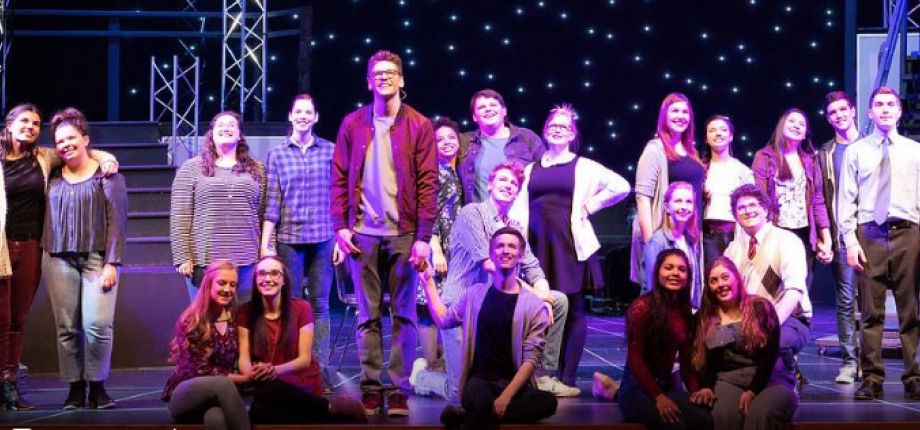Filichia Features: Some Theories on The Theory of Relativity

Filichia Features: Some Theories on The Theory of Relativity
Sheridan College in Toronto had such a good experience developing a new musical that they just had to do another.
First came Come from Away in 2012. Five years later that show made it to Broadway where it will soon celebrate its 600th performance. Since its debut, there have been few unsold seats.
Next the school's powers-that-be wanted an age-appropriate musical for their drama students. They commissioned songwriter Neil Bartram and librettist Brian Hill, who wrote The Story of My Life. (Broadway should still be ashamed for not appreciating it.)
When Bartram and Hill interviewed Generation Z performers to learn what was on their minds, they were surprised to find that the kids weren't obsessed with even a quarter of an EGOT. The young 'uns instead centered on what had been bothering them for much of their lives.
Anyone over the age of six can relate to the terror that starts the show: Taking a Test in a Difficult School Subject. Remember the questions that began "A is walking toward B at a rate of three miles an hour and B …"? They're ba-ack ...
Einstein's Theory of Relativity and other scientific tenets make the students feel as if they're just little things on this big earth. They eventually see that finding someone to love and love back can put a big dent in feeling insignificant (although one brainy pupil wishes that his girlfriend were as easy to figure as math).
There are many funny songs, including the one about Paul who's allergic to his new girlfriend Julie's cats. The identity of the person to whom he tells this story will surprise you; the reprise that comes later will surprise even more.
Most songs are plaintive. The ol' apples-and-oranges argument gets a fresh interpretation in obliquely commenting on sexuality. Two girls meet at the age of 10, then one outgrows the other, only to find that the one she left behind eventually outgrows her. A college student can indeed go home again, but what he finds won't be what he left there. A daughter who always appreciated her mother eventually values her more. Children of immigrants note the great expectations their parents have for them, and never mind what the kids want.
And what about the stranger you see who looks appealing and intriguing, but you'll never get to meet? Well, at least not getting to know that person will mean that he or she won't ever be any trouble. And yet … shouldn't you take a chance on introducing yourself if you're captivated?
If you have a talented comic actress who isn't inherently musical, give her the series of monologues that involves a germophobe who learns to overcome her fears in the best possible way.
Your performers must be well-disciplined, for the authors demand that "the full cast remain on stage for the entire show." Thus everyone must pay careful attention when others sing or speak lest focus be pulled from where it belongs.
Bartram and Hill designed the show for a cast of 13, but in the script's foreword they show how it can be done with eight or 16. Here's betting, though, that they wouldn't have grumbled at Greg Pschirrer's using 22 when he did his production at Spokane's Lewis and Clark High School in April.
Says Pschirrer, "Like many schools, we have a disproportionate male-to-female ratio; The Theory of Relativity allows for flexible casting. The show also gives each cast member a moment to shine while challenging a student to grow as an artist. The kids loved creating their own backstories that showed where these young people are in their own life journeys." He encourages such exploration for all productions.
Pschirrer wasn't merely impressed with "topics funny, clever, poignant and heartfelt. It was helping young artists to explore the themes of love, loss, disappointment, finding one's true self, disillusionment, compassion, empathy and perseverance that truly made an impact on our cast and crew."
What astonished Pschirrer was that the musical resonated with the community, too. "We were astounded by the letters and notes we received from complete strangers who thanked us for taking them on this emotional journey," he says. "I knew the students had had an amazing experience, but I was unprepared for the response from audience members. This show simply and beautifully reminds us that we're connected by a common human experience."
And that, Pschirrer is happy to report, is not just a theory.
You may e-mail Peter at pfilichia@aol.com. Check out his weekly column each Monday at www.broadwayselect.com and Tuesday at www.masterworksbroadway.com . He can be heard most weeks of the year on www.broadwayradio.com .

























